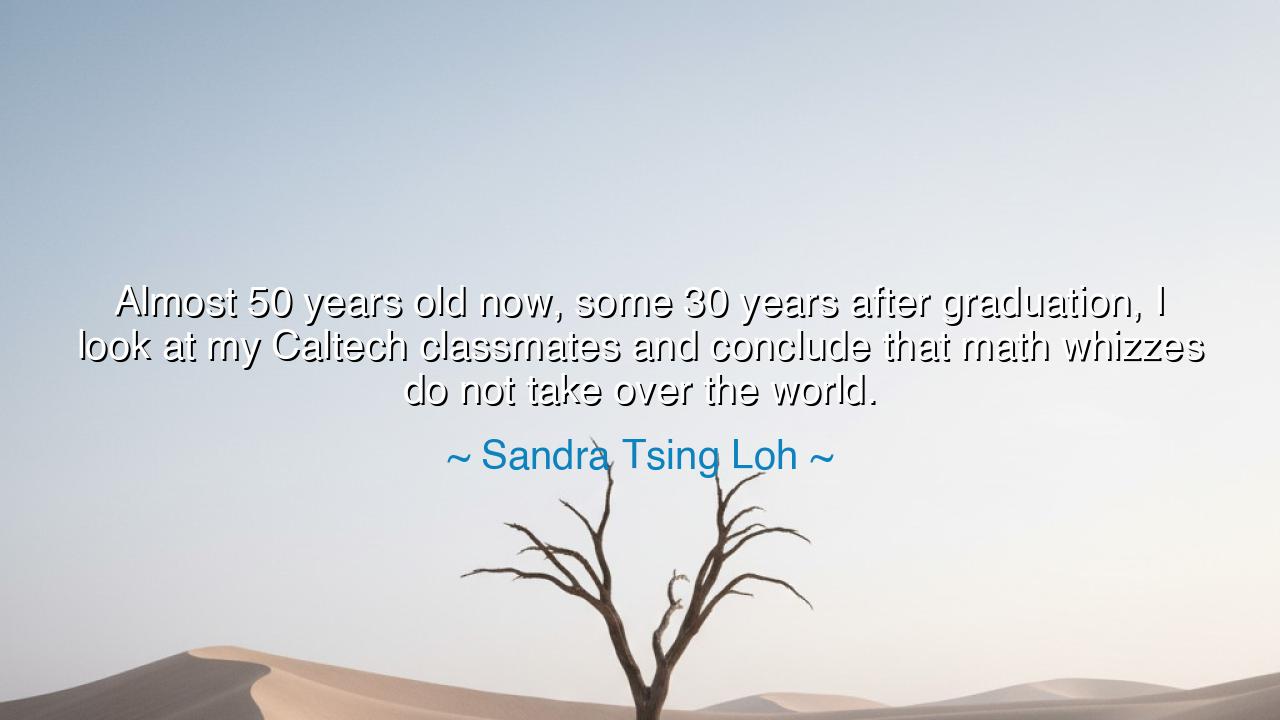
Almost 50 years old now, some 30 years after graduation, I look
Almost 50 years old now, some 30 years after graduation, I look at my Caltech classmates and conclude that math whizzes do not take over the world.






The writer and humorist Sandra Tsing Loh, reflecting on time and wisdom, once remarked: “Almost 50 years old now, some 30 years after graduation, I look at my Caltech classmates and conclude that math whizzes do not take over the world.” Beneath her wit lies a revelation about the human condition — that intellect alone does not rule life, and brilliance without balance does not command destiny. It is the confession of a mind that has matured beyond competition, seeing that the race for mastery means little compared to the quiet art of living well.
To understand the weight of these words, one must recall who Loh is and where she came from — a writer born into the world of science, having studied at Caltech, a place revered for its intellect, rigor, and the near-mystical aura of genius. There, she was surrounded by “math whizzes”, minds so sharp they could bend the language of numbers into near-magic. Yet, decades later, with the long view of life behind her, she sees that such gifts do not guarantee dominion. The world, she implies, is not ruled by equations alone, but by empathy, courage, resilience, and adaptability — traits that no formula can measure.
Her reflection echoes an ancient truth the philosophers of old also knew: that wisdom is greater than intellect. The Greeks told of Socrates, who, though surrounded by scholars and thinkers, declared himself the wisest man in Athens because he knew that he knew nothing. His humility, not his brilliance, set him apart. So too does Loh remind us that knowledge, however vast, is not the final triumph — it is the beginning of understanding, and only when joined with heart and purpose does it become true power.
Her observation also speaks to the great illusion of youth — the belief that grades, titles, and intellectual prowess define one’s destiny. Many leave university believing that those who score highest will ascend furthest. But as the years unfold, life reveals its deeper mathematics — one where kindness multiplies opportunity, where failure teaches more than success, and where the ability to adapt outweighs the ability to calculate. The “math whizzes” of her generation were not defeated by intellect, but by the narrowness of their pursuit. For the world is not conquered by the clever, but by the whole — those who unite intellect with imagination, logic with empathy, and discipline with grace.
Consider the story of Albert Einstein, himself a mathematician and physicist of the highest order, yet one who warned against the very worship of intellect. “The intellect has little to do on the road to discovery,” he once said, “there comes a leap in consciousness.” Even Einstein recognized that the most profound ideas — whether in science or in life — come not from calculation alone, but from intuition and vision. His greatness lay not only in his equations but in his humanity, his awe before the mystery of existence. Loh’s words carry that same wisdom — that the measure of a person lies not in the mind’s capacity, but in the soul’s depth.
The lesson, then, is both humbling and freeing: cultivate intellect, but do not worship it. Study deeply, strive earnestly, but remember that life’s highest achievements cannot be computed. The world needs not only thinkers but feelers; not only inventors but those who know how to live. Knowledge may open doors, but compassion and courage decide which ones we walk through. The mind is a fine servant, but the heart must remain the master.
And so, let the words of Sandra Tsing Loh be carried forward as a torch of balance and humility: “Math whizzes do not take over the world.” It is not a slight against brilliance but a call to broaden our vision — to remember that the true rulers of the world are those who learn to blend intellect with insight, precision with purpose, and knowledge with love. For in the grand equation of life, it is not genius alone that prevails — it is the harmony of mind, heart, and soul.






AAdministratorAdministrator
Welcome, honored guests. Please leave a comment, we will respond soon